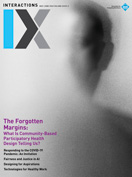Authors:
Helena Mentis, Regan Mandryk, Allison Druin, Andrew Kun, Shaowen Bardzell
As identified by Jen Mankoff [1] four years ago, accessibility at our conferences is a wicked problem that requires an alignment of mental models as well as clear communication. Thus, we are taking this opportunity to communicate what SIGCHI has put in place over the past four years and the steps it is taking next so that the SIGCHI community can better understand the mental model of how accessibility requests are addressed by a conference.
To provide an inclusive conference experience, we support accommodations covering a broad spectrum, for example sign language interpreters, mobility aids, quiet rooms, and gluten-free foods. Typically, conference participants submit their requests around registration time (one to three months prior to the conference itself). Requests vary from year to year and can be covered by the conference's contingency, the portion of the conference's budget that must be held for expenses that had not been foreseen when the budget was created. However, sometimes that contingency has already been spent on, well, contingent costs that pop up. In those cases, SIGCHI can step in to help: The SIGCHI policy since February 2017 is that any accessibility request from one of our 24 sponsored conferences that cannot be covered by contingency will be covered by SIGCHI.
Although this funding mechanism is sufficient, a clear budget allocation makes these funds more explicit. Starting with CHI 2020, the conference series now has a budget line item for accessibility requests based on the historical data of investment the conference has made in the past few years for, for instance, sign language interpreters and CART systems. Likewise, starting in the FY 2021 budget, SIGCHI has a budget line under the vice president for conferences for those requests that cannot be covered by contingency. This is in addition to the SIGCHI budget item for an accessibility consultant. SIGCHI recently hired Accessology, an accessibility consulting service dedicated solely to all facets of access compliance [2], to be an accessibility advocate, innovator, and resource for all of our 24 conferences.
But none of these mechanisms that SIGCHI has put forth are useful to conference-goers if they are unaware of what is available and if conference chairs are unaware of what is possible. So, first, at the recent SIGCHI Council of Steering Committee Chairs meeting, we communicated to our 24 conference steering committee chairs that providing this information well ahead of time on their conference's website fosters an inclusive experience for all participants and may actually increase submissions from excellent researchers who might not have normally submitted to their conference.
Second, we are writing this piece to share these mechanisms with the SIGCHI community to raise awareness for those who need accommodation as well as for future conference leaders. If you need accommodation, do not hesitate to make a request to the conference. If the conference has an accessibility chair, write to that person. Otherwise, reach out to the conference's general chair. Please keep in mind, though, that the earlier you make a request, the easier it will be to satisfy it.
If you need accommodation, do not hesitate to make a request to the conference.
Third, the remit of the new SIGCHI accessibility consultant is to provide hands-on expertise in how to create an inclusive conference experience and raise awareness of inclusive practices to enact early in the conference-planning process. It is understandable that conference general chairs have a lot to keep straight and consider—even for the smallest of conferences, this is a tough job. By providing this additional expertise, we are committed to taking a significant step in ensuring that accessibility needs are seamlessly integrated. If you wish to support this effort, please reach out to your favorite conference and offer your services as accessibility chair. You won't be doing it all alone—there will be another person dedicated to supporting you in this important role.
As Helena said at last year's SIGCHI town hall, what we need is a culture change. This isn't about infrastructure or money but rather an opportunity for our conferences to ensure that everyone has an equal opportunity to participate and contribute to our knowledge community. And we can all continue to iterate on solutions and raise awareness in order to grow together as a community.
1. http://interactions.acm.org/blog/view/thoughts-on-the-sigchi-accessibility-report
2. https://accessologyblog.wordpress.com/
Helena Mentis, SIGCHI President, [email protected]
Regan Mandryk, SIGCHI Adjunct Chair for CHI, [email protected]
Allison Druin, SIGCHI Adjunct Chair for Diversity and Inclusion, [email protected]
Andrew Kun, SIGCHI Interim Vice President for Conferences, [email protected]
Shaowen Bardzell, SIGCHI Vice President at Large, [email protected]
Copyright held by authors
The Digital Library is published by the Association for Computing Machinery. Copyright © 2020 ACM, Inc.









Post Comment
No Comments Found